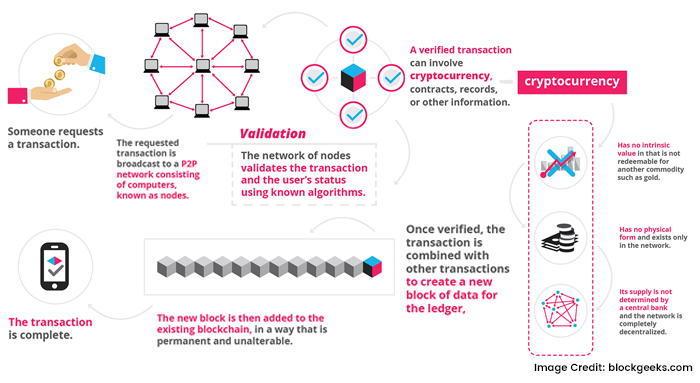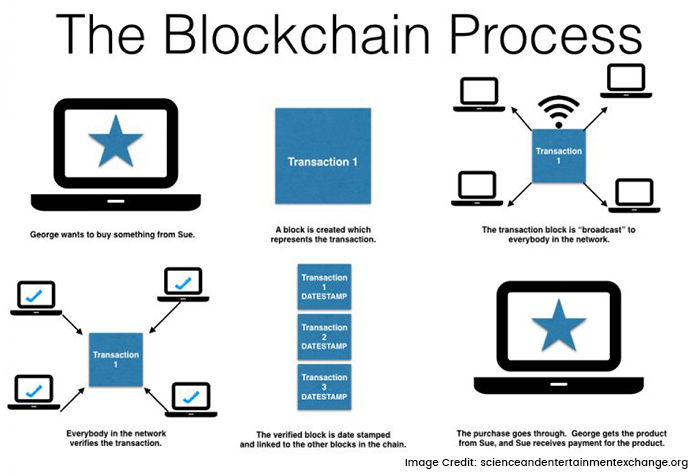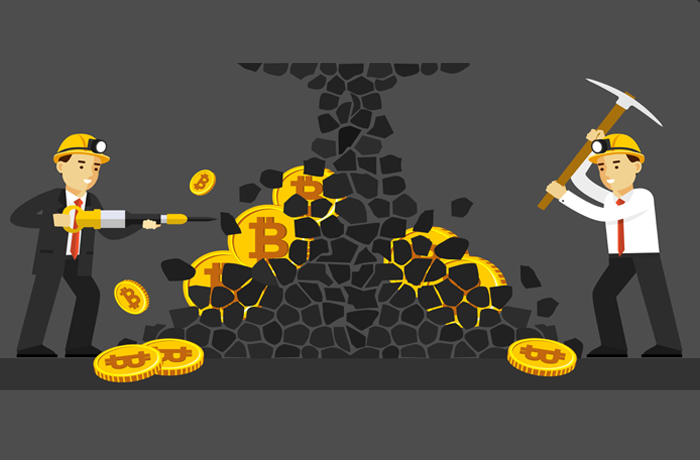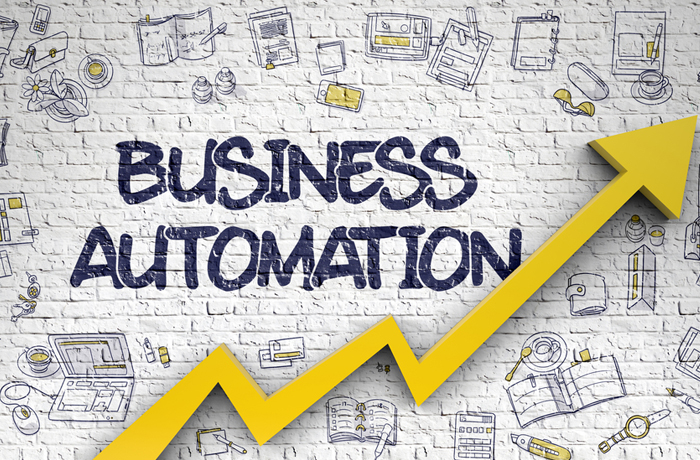Blockchain Technology Benefits – Here’s Everything You Need to Know

As the case with new inventions, what is known about the blockchain is wrongly described by many people.
The blockchain is not bitcoin, and Bitcoin is not the blockchain, but a type of blockchain and a cryptocurrency. As you read more of this guide, you will learn more.
What is Blockchain?
A blockchain incorporates a cutting-edge mathematical model, which stores information uniquely with almost a zero chance of being adulterated.
The blockchain is becoming more prominent across the globe.
Blockchain operation is based on cryptography, which encrypts data uniquely making it ineligible to anyone aside from the intended user to understand.
Let us now look at it a bit more closely.
On a blockchain, nodes or linked computers are used to receive transaction into the network.
Once the transaction details are received, the node is responsible for broadcasting the details on the network. Now, other linked computers on the network verify the transaction information autonomously to help avoid falsified transaction details.
After it has been verified, the digital signature attached will also be examined by the processing nodes. For instance, sending a bitcoin will generate a transaction string by combining the sender’s public keys and private keys.
The chain helps identify the message, which is why it is impossible to re-use an already verified digital signature.

Next, all legitimate transactions waiting to be validated are collected by the nodes and ordered into a set.
Furthermore, the ordered sets are validated as blocks after it has been broadcast on the network. The mathematical-structured program then receives the blocks in sets -depending on its occurrence.
Blockchain makes it possible and easy to trace transactions, as newly-added blocks get labeled with a transaction reference, (marked with a preceding block hash).
A Brief History of Blockchain Technology

In 2008, Satoshi Nakamoto invented the Blockchain.
Blockchain garners the attention of everyone has its importance, uses and application are becoming public knowledge. The increasing public interest in blockchain has led other technologists and researchers to explore how the crypto network works.
After the Bitcoin blockchain gained prominence, another emerged and was launched in 2015. This was called Ethereum, and Vitalik Buterin invented it.
One outstanding feature of the Ethereum blockchain is its usage as a platform to issue cryptocurrencies.
Buterin’s work helped him realize that blockchain records more than just cryptocurrency data. His realization brought about smart contracts on the Ethereum blockchain, which is capable of reading computer programs.
An ideal blockchain works like a public register; storing transactional data permanently and for easy verification between two or more parties.
Older versions of blockchains- 1.0 to 3.0- find it impossible to interact with other networks. Now, newer versions of blockchain – 4.0 and later -can communicate with peer platforms
A limitation of blockchains at present is limited interactions. For instance, sending transactions from the Bitcoin blockchain to the Ethereum blockchain is not possible.
Any transaction between different blockchains has to pass through a third-party service, resulting in time and resources being wasted. This has drawn criticisms from various commentators and stakeholders alike.
Furthermore, other blockchains have significant features that make the innovation beneficial to the human race. For instance, smart contracts enable a blockchain to process a given transaction in accordance with pre-determined terms.
Now, blockchain can efficiently and transparently handle any given transaction automatically-thanks to the smart contracts.
In recent reports, the blockchain has been confirmed to be ideal for election reporting. As the results are entered electronically from the polling booths into the blockchain, the integrity of results is protected.
Key Concepts Encapsulating the Bitcoin Technology
To understand how bitcoin technology works, it is important to look closely at the defining tenets of the blockchain.
The Idea of Decentralization

Nakamoto incorporated a non-trust feature -a consensus mechanism between nodes while designing bitcoin. This is to help avoid any doubt or issues that may arise under a centralized system.
This mechanism regards all nodes as equal. Therefore, if the numbers of nodes acknowledging a given transaction increase, the risk of multiple payment issues decreases and vice versa.
Besides, the bitcoin system has its credit value, which is after a ledger transaction has proven valid by a significant number of nodes.
Beginning with the consensus mechanism, Nakamoto unintentionally came about the idea of decentralization.
What’s more, blockchain isn’t a single piece of technology. It combines various substantial technologies: asymmetric encryption, point-to-point network, and blockchain data structures-to mention a few. Decentralization is a fantastic mechanism with no trust but consensus between nodes.
The blockchain is based on a decentralized and non-trust system, which projects its application in an open source user case direction. Specifically, it should go for consensus after an open source of data.
Beyond doubt, the blockchain glows radiantly because of its innovative decentralized system. A system with an open source information storage and processing ability, which relies solely on consensus between nodes.
However, a few consortium blockchains and private blockchains are based on a consensus system.
A Network of Nodes

A node is an electronic device internet-connectivity capacity and also has an IP address. Examples include a computer, smartphones, printers, and so on. Nodes are essential as they help maintain the duplicate of a blockchain and, as the case may be, process transactions.
Nodes are usually organized in the manner of a tree, often called binary trees. Each cryptocurrency has a spot on the binary trees, where it maintains transaction records according to specification.
The blockchain is a much bigger data structure with node owners coming together to actively contribute to the structure. Node owners help store and confirm transactions, thereby having the opportunity to receive the transaction fees.
Also, there’s a possibility of getting a reward for doing just that. This is popularly called mining or forging.
Collectively, these nodes form a robust second-level structure, which gives a new perspective on transaction validation.
On the Bitcoin Blockchain Network, every node is nothing less than an administrator immediately the network is joined.
Amazingly, each node owners get to receive an incentive for helping out on the network – a chance to earn more bitcoin.
It’s a common saying that node owners are “mining” Bitcoin, but that term is misleading. Each node competes to win Bitcoin, and it’s about solving computational puzzles.
In fact, Bitcoin was the purpose why blockchain existed and was initially conceived. And now, it is regarded as the pioneer of many other applications of the blockchain.
At present, cryptocurrencies known to man are approximately about 1500. It doesn’t end there; several other projects (in development) are adopting the blockchain concept.
Bitcoin Wallet

Bitcoin is moving higher on the currency chain with more recognition granted to it globally. It is a worthy alternative to the government-backed currencies (paper note or coins).
Bitcoin advocates claim that the digital currencies offer more than the traditional currencies. Simplicity, safety, and Privacy come with bitcoin compared to conventional currencies.
It has appeared to be an excellent investment opportunity since its value compared to the U.S. dollar and other currencies have been on the rise.
Investing in Bitcoin starts with a wallet.
Why?
Almost everyone has a bank account with a bank; this is precisely what a Bitcoin wallet means. It functions like a bank account — receiving, storing, and sending bitcoin.
A bitcoin wallet is similar to the online bank account, which serves as your private interface to the Bitcoin network. Inside a Bitcoin wallet are private keys; allowing you to send your bitcoin using the secret codes.
The private keys are the ones needing protection not your bitcoin in the wallet.
So, to sum it up, a Bitcoin wallet is any device, application, program or website that helps keep and manage your private keys.
These next few lines show you what a bitcoin wallet is and how to make the right choice. If you have a proper understanding of the risks involved in investing in Bitcoin, then any of the following Bitcoin wallets should serve you well.
Web wallets
Here, all private keys are stored online and are protected by a user-selected passcode. Although web wallets offer the least level of security, it still has terrific benefits of being accessed anywhere.
The blockchain is the raison d’etre for Bitcoin and other existing digital currencies. An example is MetaMask or the My Ether Wallet.
Desktop wallets

With few steps, you can download and install a desktop wallet on your PC. For those who are worried about privacy, then Bitcoin core wallet is recommended since it isn’t built to use third parties for data.
A good example of a hardware wallet is Electrum. It stores your Bitcoin in a set of files on your computer. At the moment, it works with most versions of Windows, Mac OS X, Linux, and Android.
It has some advantages over other ordinary hardware wallets like flexibility and ability to work with specific physical wallets.
Mobile wallets
One of the simplest ways you can buy, sell and keep digital currencies is provided by Coinbase. It earned its first spot on this list with its incredible added features. Aside from bitcoins, it supports other digital currencies: Bitcoin Cash, Ethereum, and Litecoin. Also, the rumor of Coinbase supporting additional currencies such as Ripple is gaining momentum.
Coinbase is easy to use, but some worries have arisen concerning its security. Other mobile wallets have suffered from hackers[1] with several millions of dollars lost.
This tragedy has been the inspiration for Coinbase to keep wallet security loophole-free and assuring.
Hardware wallets
This may be the most secure and effective way of keeping bitcoins, so you don’t get hacked. Your private keys are stored offline.
This means you don’t need to be bothered about using one on a malware infected PC. Ledger Nano is the best-known hardware wallet. Trezor is another example.
How Does the Blockchain Work?

Just as the earth, through its constant rotation, brings about a ‘night and day’ trend, and cannot be stopped.
So also is the Blockchain technology. It has a non alterable and pre-ordered way in which it performs its transactions.
Note the following steps for more information on how the Blockchain technology performs its processes:
Transaction Initiation
Various blockchains have a unique way they carry out their transactions. For the Bitcoin blockchain, a transaction is initiated when Bitcoin is transferred between parties. This is not the same for some others like the Ethereum and the Litecoin blockchains.
On the Ethereum blockchain, for example, the smart contract is used to send and receive Ethereum between parties.
Transaction Broadcast
In broadcasting the transactions, a peer-to-peer system is used; i.e. a system which allows every system connected to a network to be accessible by that network, and allows every other system to share data with one another.
For example, if there are two people sending or receiving tokens respectively, then the network accesses both systems to verify if they are able to carry out the transactions legally.
It also verifies if they have enough tokens, as required, to carry out their transactions.
Pre-Block Creation
A block is a stored record of recent but unique Bitcoin transactions. In building blocks, more is usually added to an existing chain, and the whole chain is called a blockchain.
Before blocks are created, nodes or computers connected to the network are required to validate the transactions.
New Block Creation
In creating a new block, the information being imputed must be unique, i.e., it must not have been in any previous block. Also, for each block to be created; there is a very difficult mathematical problem that must be solved.
Only a valid answer will result in the creation of the block, i.e. the blocks will then be submitted to the network.
Recording New Blocks
After the block is created, it becomes more and more difficult to add more blocks. This process is to ensure that the chain remains difficult to break at any point.
What are the Benefits of Blockchain Technology?

Blockchain technology offers the world a chance to optimize the processes involved in many facets of human endeavor.
Medicine, supply chain, accounting, invoice discounting, energy supply and distribution, are some of the areas already experiencing the blockchain revolution. Let us look at some of these areas in closer detail:
Supply chain management.
Have you ever wondered why B2B systems thrive much more in our world today? Blockchain technology is the answer! Today, through blockchain technology, we have a more traceable and cost-effective way of running transactions.
Interestingly, it finds good use in the transportation of goods too because of the ease and affordability it brings. It can also help to keep track of goods and give specific details about such goods.
Details like: its origin, its quantity, and its quality are derived; thereby enhancing business or production transactions.
Quality assurance.
Blockchain technology is one that can easily detect inconsistencies in a production chain. Anytime a fault is detected in a production line, then one can use the blockchain to detect it.
This is a very easy and efficient way of ensuring that the food produced by an industry is of good quality. Other companies other than the food industry also find it useful for quality assurance because of its unparalleled ability to track.
Accounting
It is very secure to record information using blockchain. The blockchain is developed in such a way that makes it impossible to alter information without disrupting the whole process. This can keep your information from fraudulent activities.
When storing information on the blockchain, every transaction is verified each step of the way, i.e. from block to block. However, your records are stored in such a way that the audit trail is traceable.
With these amazing security that blockchain offers, it is very safe to have a joint account as a corporate organization. In fact, your financial records too can be kept securely this way.
Business Automation

Blockchain makes it possible to have a custom software logic which carries out automated events.
Rather than having people to be the ones dealing with such things as queries, questions, important information dissemination and a lot of activities that consume money and people’s time. Smart contracts automatically do them but based on the rules in the data written to them.
With blockchain, it becomes easier to offer services to the third party or the public. You can give people as much information about the services you offer without having to disclose confidential things about your company.
Bill Gates, the founder of Microsoft, once said, “Bitcoin is exciting because it shows how cheap it can be. Bitcoin is better than the currency in that you don’t have to be physically in the same place and, of course, for large transactions, currency can get pretty inconvenient.”Famous artist and producer, Akon, said, “Bitcoin is going to change the world from a money transactional standpoint not just for Africa but for everywhere.”
What Currencies are Supported in the Blockchain Wallet?
You can access useful updated information about Bitcoin transactions on blockchain.info. On this platform, you would see details such as the market value of Bitcoin, latest transactions, and the prices.
You can also estimate the daily frequency for Bitcoin transactions which will inform your decisions on crypto-trading. Furthermore, you would see the most thriving Bitcoin wallets, study them and choose the most appropriate ones to invest in.
Whether you are on the road and can only access a phone; or you have your PC with you in your office; you can access blockchain.info either way.
Wherever you are and whenever you want, you can access it – all at your fingertip. There is an app that can be downloaded for use on mobile phones, and a web address for use on PC.
All you need to access your account is your wallet ID. It can, however, be cached on your browser for ease of access.
If you are very security keen, you can also use the ‘double verification’ which will require your email or phone number to authorize a login attempt.
Blockchain.info does not store all coins actually. However, it is really effective in storing both Bitcoin and Ethereum.
The Future of Blockchain

Blockchain has enjoyed diverse use in many spheres of life. Its influence and the simplicity it has brought to life are incredibly amazing. The points below are few of what blockchain technology offers the general public:
- Blockchain can be used in election procedures since it is impossible to alter a data without disrupting the whole system. Hence, fraudulent attempts during elections would prove abortive.
- This application also finds use in the finance sector, because it ensures transparency in payments and finance-related events.
- Blockchain is very useful in tracking inconsistencies in transactions. Therefore, it ensures that the standard of raw materials is maintained since it can trace the origin of such materials.
- In fact, many health organizations are adopting the technology in offering services to patients. Many patients can now access their doctor, medical history, etc, from their living rooms.
Conclusion
The effect of the blockchain on our world is yet unfolding, and as a new body of knowledge, ideas will spring forth in the days to come.
It is a decentralized service that allows many users to access data, update data, and view recent records whenever they want – even at the same time too.
Its peer-to-peer system makes it impossible for the huge amount of data to be lost. Hence, you can be sure that your data is always safe. As people research and develop more and more, then we would find that the possibilities with the blockchain technology are endless.
Feature Image Credit: shutterstock.com
Inpost Image Credit: shutterstock.com
Disclaimer
The writer’s views are expressed as a personal opinion and are for information purposes only. It is not intended to be investment advice. Seek a duly licensed professional for investment advice.More Posts
Regulatory challenges of Security Tokens
Photo by Markus Spiske on Unsplash We like to talk about digital coins and the tokenization of products services and pr...
BNB Reaches New Highs After Binance Launches Own DEX And Blockchain Network
Binance announced that they launched testnet of Binance Chain. Shutterstock Images Binance, one of the largest and most...
Cosmic Messages: Allows Bitcoin Holders to Send Messages into Space
Cosmic Messages to allow communication into space. NASA/JPL Images By replacing Blockchain’s transmission via satel...
Senate Bill 5638: What Does the New “Blockchain Bill” Mean for Washington State?
Washington Electronic Authentication Act would be revised by Senate Bill 5638 (SB 5638). Shutterstock Images On Janu...













